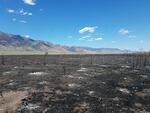The Trump administration has finalized a plan to construct up to 11,000 miles of fuel breaks to control wildfire on federal land in six Western states, including Oregon.
Local Bureau of Land Management offices plan to use a variety of methods, including prescribed burning, mechanical removal, chemical treatment, seeding, mowing and targeted grazing to remove trees and plants that could fuel wildfires along roads and rights of way.

In 2017, the Fields-Andrews rangeland fire protection association helped put out a fire near Steens Mountain in southeastern Oregon.
Courtesy of the Oregon Department of Forestry
Trump administration officials say the plan will slow the spread of wildfire on rangelands, where sagebrush habitat and the wildlife that depend on it are disappearing.
“This is a major step in fulfilling the President’s commitment to western communities by implementing more effective wildfire treatments that will better protect Americans, their property and their lands,” Secretary of the Interior David Bernhardt said in a statement released Wednesday.
Administration officials say the BLM has found 79% of the fuel breaks the agency has assessed since 2002 have been effective in helping to control wildfires. They say wildfire is causing the disappearance of sagebrush habitat in the Great Basin, which covers a wide swath of the West including southeastern Oregon.
Tim Ingalsbee, executive director of Firefighters United for Safety, Ethics and Ecology, said cattle grazing and invasive species like cheatgrass are much bigger problems for sagebrush habitat than wildfire.
“They should kick the cows off the land,” he said. “That’s who’s doing the most damage in terms of fire, changing the vegetation makeup and spreading invasive weeds.”
Ingalsbee said it’s unlikely the federal government will be able to maintain such a massive amount of fuel breaks, and without maintenance, they will likely be taken over by more flammable invasive species.
Moreover, he noted, the landscapes are so vast in the Great Basin, firefighters won’t be able to reach the fires in time to make use of the fuel breaks.
“The fuel break scheme is predicated on continued fire suppression and fire exclusion and that’s not sustainable,” he said. “It’s an endless, escalating and unwinnable war against wildfire. Fuel breaks really only have an effect if there are firefighters to take advantage of them. If they’re not, the wildfire will breach the fuel break just like they breach roads and rivers.”
Interior Deputy Director of Policy William Perry Pendley said the Trump administration also has plans for rangeland restoration in the Great Basin that will make the fuel breaks more effective.
“Constructing a system of fuel breaks is a critical first step to reduce the risk of more catastrophic wildfires in the remaining intact sagebrush communities, but we can’t stop there,” he said. “Fuel breaks will be most effective when combined with fuels reduction and rangeland restoration treatments and we’ll soon release a draft plan to provide for those in the Great Basin as well.”
The administration’s final plan doesn’t authorize any specific projects. Local BLM offices will be designing their own plans for fuel breaks and rangeland restoration across 223 acres in Oregon, Washington, California, Idaho and Nevada.
